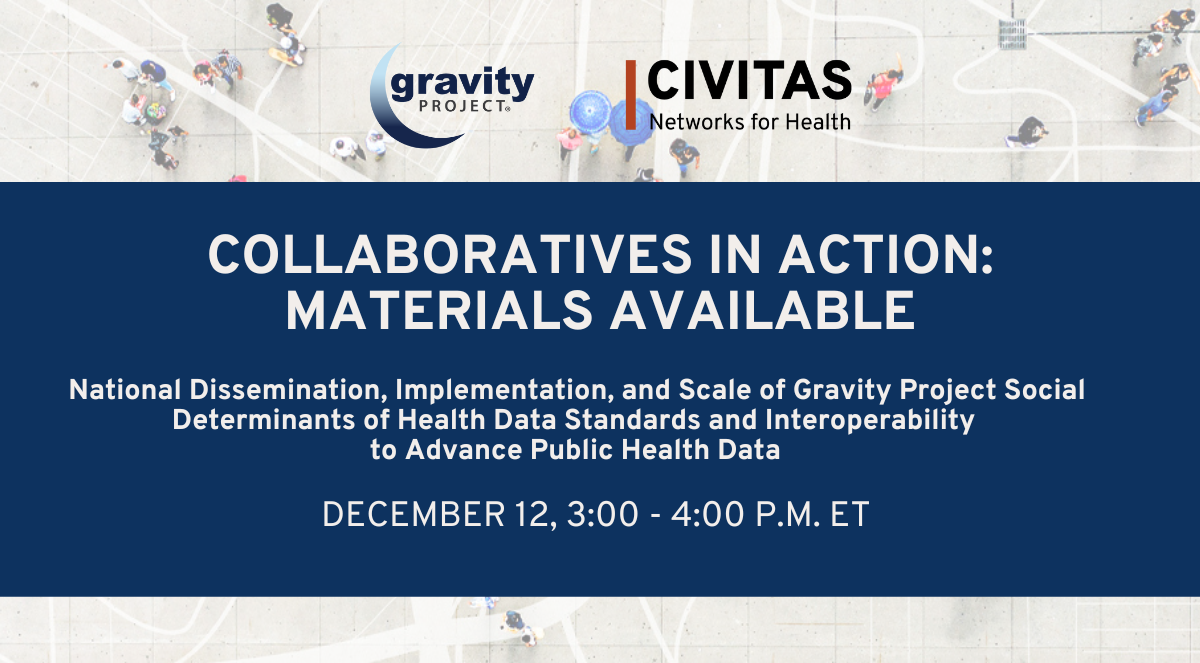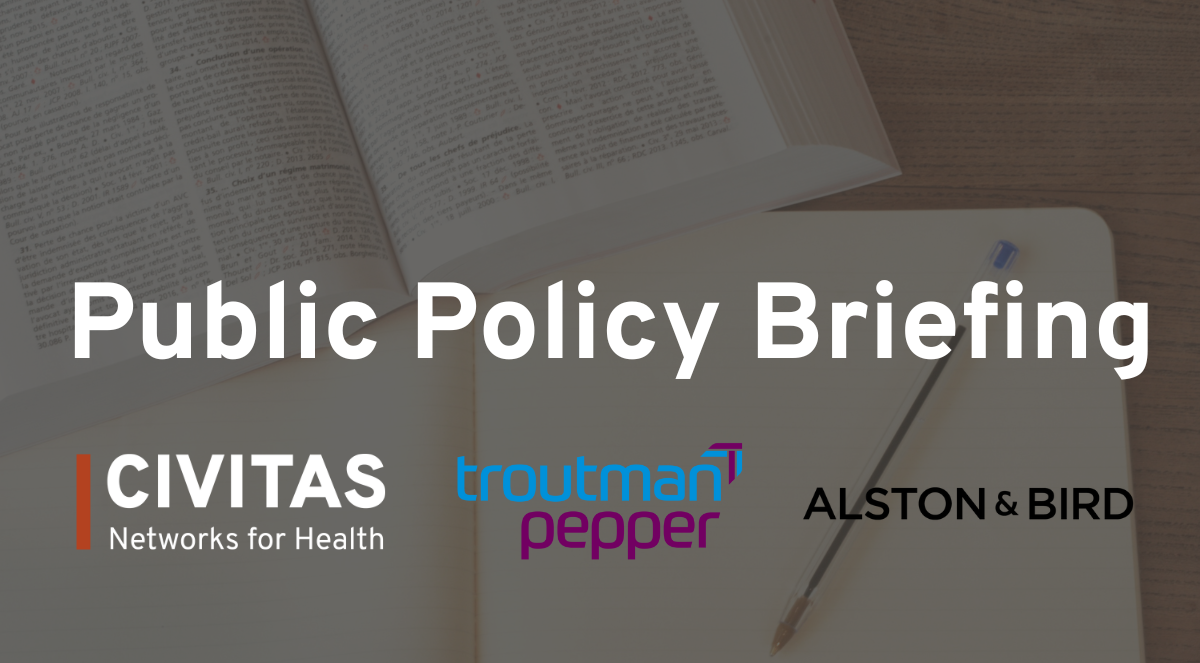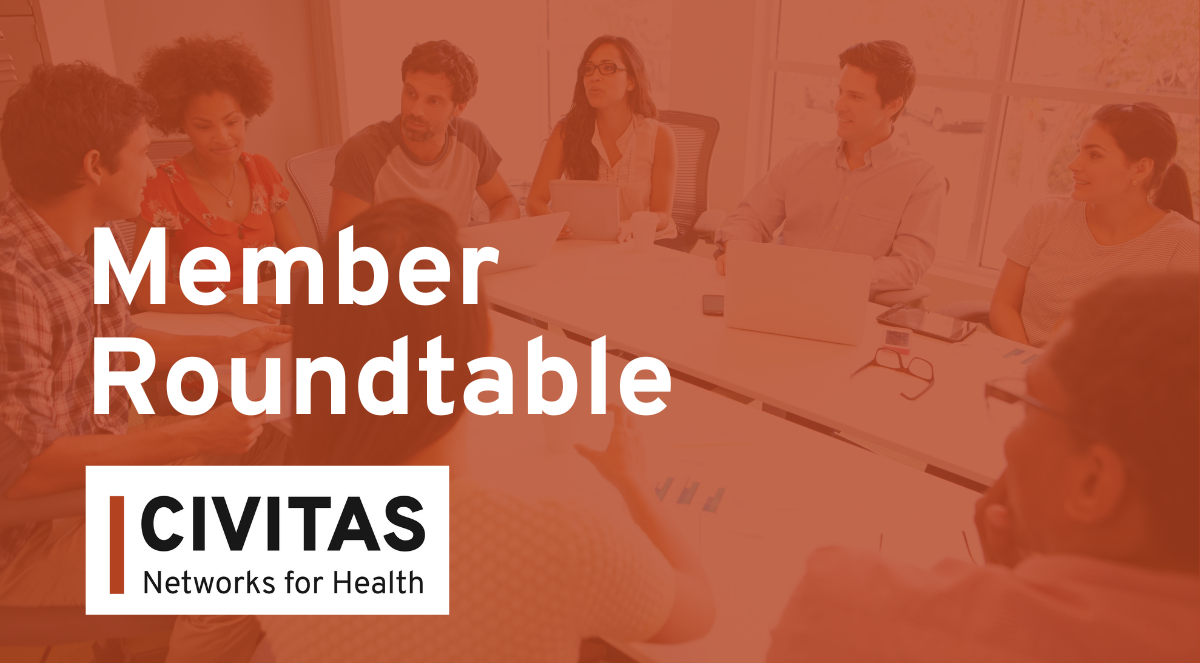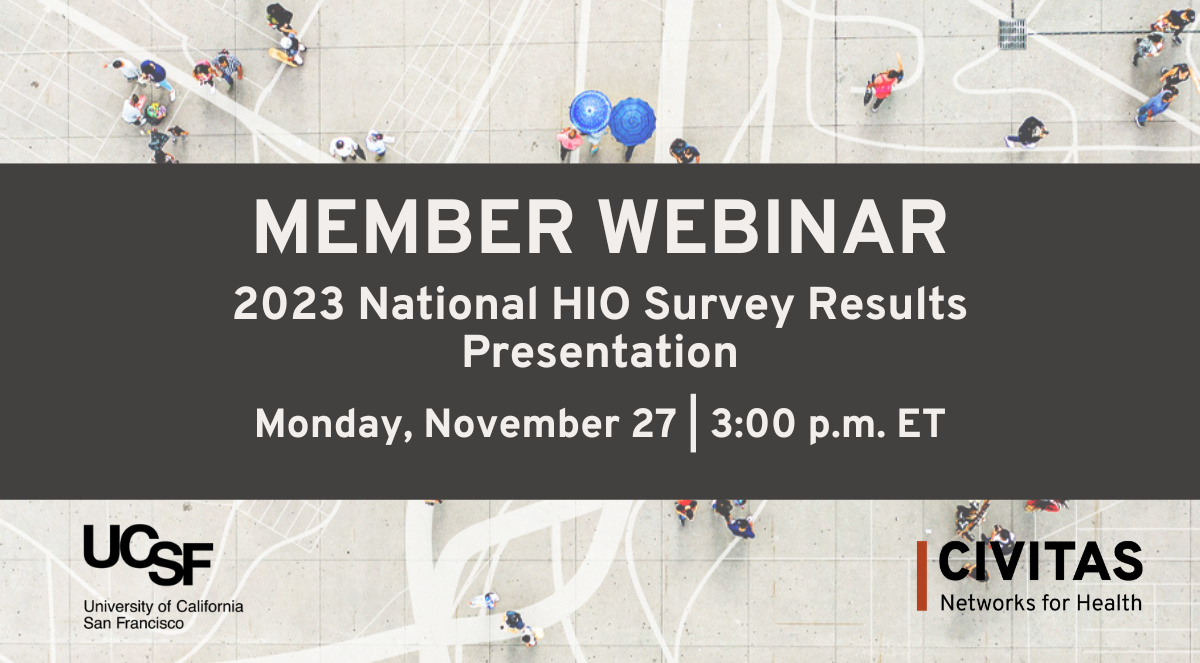Key Learnings from the National Health Information Organization Survey Results
Comprehensive health data exchange is a critical step in improving health outcomes. Understanding the landscape of National Health Information Organizations (HIOs) is more important than ever as we chart the path to national interoperability. In a Civitas member-only webinar in November 2023, the Civitas team presented the results of the Civitas supplement portion from the 2023 National HIO Survey sponsored by the Office of the National Coordinator for Health Information Technology (ONC) alongside a team from the University of California San Francisco’s Center for Clinical Informatics and Improvement Research (CLIIR) led by Principal Investigator, Julia Adler Milstein, Ph.D. This team worked closely with Civitas members, including HIEs and emerging Health Data Utilities (HDUs) nationwide. The data points extracted from the survey offer invaluable insights into the status, progress, and challenges of HIOs across the United States.
In this article, we’ll share key insights from our webinar discussion and data analysis.*
Navigating Medicaid Funding Pathways
Medicaid funding pathways play a pivotal role in the services and operations of HIOs; 96% either receive ongoing Medicaid match funding or have quality reporting partnerships in place with their State Medicaid Agencies (SMAs). The survey indicated a notable shift in how these organizations harness these pathways to sustain their operations and innovate and expand their services. Given the complex regulatory and financial environment surrounding Medicaid, this shift is significant.
HIOs are increasingly aligning their strategies with Medicaid reforms and initiatives, tapping into new funding opportunities that support the transition towards value-based care models. This alignment is critical for HIOs to stay relevant and effective in a health care system that is steadily moving away from fee-for-service models and better meeting the needs of underserved communities.
Expanding Partnerships and Network Connectivity
The survey also highlighted a trend toward increased collaboration across operators of health data infrastructure, as HIOs forge connections with national networks and engage in new initiatives like the Trusted Exchange Framework and Common Agreement (TEFCA). This trend indicates that HIOs strive to broaden their reach and interoperability capabilities. By participating in these national initiatives, HIOs are expanding their geographical coverage and enhancing their ability to exchange health information more efficiently and securely across different regions and health systems.
These partnerships are vital for HIOs to achieve interoperability that transcends local or state boundaries, which is essential in today's health care landscape where patient mobility and cross-state health care delivery are commonplace. Furthermore, these collaborations provide HIOs a platform to share best practices, learn from each other, and collectively address common challenges.
Diversifying Revenue Streams and Services
Perhaps one of the most striking observations from the survey is the diversification of revenue streams among HIOs. In an environment where financial sustainability is a constant challenge (and just two years after a decade of HITECH Act federal subsidies ended), HIOs are finding innovative ways to diversify their funding sources. This diversification is not just a financial strategy but also a reflection of the expanding roles and services of HIOs.
By moving beyond traditional funding models, HIOs are exploring new avenues such as partnering with private entities, engaging in data analytics services, and venturing into areas like population health management. This expansion is particularly evident in their adoption of services that support value-based care models. HIOs are developing capabilities to provide more comprehensive data analytics, risk stratification, and quality measurement and reporting support. These services are crucial for health care providers operating under value-based contracts, requiring detailed and actionable patient data to improve care outcomes and control costs.
Health Information Exchange Support for Public Health Reporting and COVID-19 Response
The survey illustrated the critical function of HIOs in public health reporting, particularly during the unprecedented COVID-19 pandemic. The agility and responsiveness of HIOs in providing crucial data rapidly during this crisis cannot be overstated. This capability was especially pivotal in addressing health equity concerns, such as the disparities in COVID-19 impact and vaccine distribution across different races, ethnicities, and language groups. HIOs’ ability to collate, analyze, and disseminate data pertaining to these variables played a significant role in informing public health strategies and interventions, and strengthening public health infrastructure.
HIOs were instrumental in filling critical data gaps during the pandemic, enabling public health agencies to make informed decisions in real-time. This function was not limited to the collection and reporting of data but extended to providing insights into the socio-demographic aspects of health, which are crucial for understanding and addressing health inequities. HIOs’ contribution in this regard went beyond traditional health data management, encompassing a broader spectrum that includes social determinants of health. Their involvement ensured that public health responses were swift, nuanced, and sensitive to the diverse needs of communities.
Preparing for Future Pandemics with Health Information Organizations
The survey’s findings on HIOs' involvement in public health reporting and response to COVID-19 are invaluable for preparing for future pandemics or health crises. The demonstrated ability of HIOs to rapidly mobilize and disseminate critical health information is a cornerstone in building a resilient public health system.
As we move forward, the role of HIOs is likely to expand further, not only in managing health data but also in predictive analytics and aiding the formulation of proactive public health strategies. Their involvement in identifying trends, predicting outbreaks, and facilitating a coordinated response across various healthcare and governmental entities will be crucial. This enhanced role of HIOs, as evidenced during the COVID-19 pandemic, positions them as indispensable assets in current and future public health endeavors.
The Future of Health Information Exchange
The comprehensive data presented in the webinar paints a picture of an industry in flux but poised for significant impact. As HIOs continue to adapt and evolve, their role in public health, regional and national interoperability, and health care policy become increasingly central to the information enterprise at the core of the modern health system. The survey results provide a snapshot of the current state of HIOs and offer a roadmap for their future development—including the ongoing shift of HIEs to the HDU model—and further integration into the broader health information landscape.
The National Health Information Organization survey results offer a deep dive into the evolving world of HIOs. By understanding their challenges, successes, and evolution, stakeholders can better appreciate these organizations' integral roles in shaping the health care and health data interoperability landscape.
*More insights will be shared on the research, and more comprehensive data will be produced by our research partners in 2024.
We encourage you to reach out to the Civitas team with questions or to learn more about the research, and/or if you’re a Civitas member and want to be added to our event notification emails, please get in touch with our team.
Advocating for Continuity in Health Care Quality: Making a Push for QPP-SURS Reauthorization
By: Alan Katz, Associate Director of Advocacy and Public Policy, Civitas Networks for Health
In health care, ensuring the provision of quality services, especially in small, underserved, and rural areas, is a challenge that demands innovative solutions and sustained support. Recognizing this, a concerted effort is underway to restore a crucial program that has been pivotal in advancing health care quality in these communities. The focus of this endeavor is the reauthorization of the Medicare Quality Payment Program—Small, Underserved, Rural Support (QPP-SURS), a program that ran from 2017 until it expired in 2022 and would be revived by the passage of the bipartisan SURS Extension Act, H.R. 5935.
The Importance of QPP-SURS
Before it expired in February 2022, QPP-SURS was instrumental in providing technical assistance (TA) to small health care providers eligible to participate in Medicare’s Quality Payment Program who would otherwise have a much harder time managing an informed and effective transition to QPP themselves. Many of the specialized quality improvement organizations that were tasked by the Center for Medicare and Medicaid Services (CMS) with TA implementation under SURS are Civitas members, whose extensive experience facilitating value-based care through the ongoing Quality Improvement Network—Quality Improvement Organization (QIN-QIO) was critical to rural and underserved providers. In the process, the SURS program facilitated connectivity between these practices and their state and regional Health Information Exchanges (HIEs) to enable real-time data sharing. This support is not just a matter of administrative or technical aid; it’s a critical step in ensuring that smaller health care providers are not left behind in the rapidly evolving landscape that combines incentive payment structures with dynamic health information technology to realize new efficiencies and measurably enhance patient care.
Of particular significance is the role of seven Civitas Quality Improvement Organization (QIO) members who were integral to the implementation of the QPP-SURS program under contracts with CMS. Their involvement highlights the program’s tangible impact and the expertise that these organizations bring to the table.
This blog will feature the efforts of two Civitas Networks for Health members, but first let’s cover the current state of affairs.
Current Congressional Lobbying Efforts
To bolster support for the SURS Extension Act, a congressional lobbying effort is presently being organized, supported by several of Civitas’ QIO members and Civitas’ Government Relations team. The aim is to increase bipartisan backing and help build momentum for this bill on Capitol Hill, emphasizing the vital role of QPP-SURS in enhancing health care quality and accessibility. In the first set of meetings, key players like Comagine Health and Mountain Pacific Quality Health are set to participate, given that their QPP-SURS service areas cover several of the most critical congressional offices.
These efforts overlap with the plans of the American Health Quality Association (AHQA), which represents QIOs nationally, mutually reinforcing the interests of the unique and mission-critical QIO sector while also providing a more focused and direct appeal for the program’s reauthorization. The participation of these organizations is instrumental in illustrating the on-the-ground impacts and successes of the QPP-SURS program.
Assembling Information
The impact of advocacy in support of SURS reauthorization depends in large part on getting the right information about the program’s efficacy in front of the right people. Civitas QIO members are currently in the process of gathering this information to showcase the value of their QPP-SURS work for policymakers representing key states and detail best practices for SURS-funded activities. This information will be critical in crafting a compelling pitch to important congressional offices, highlighting the program's successes—on average, over 107,000 clinicians nationwide received SURS TA each year of the program’s operation—and the ongoing repercussions of its discontinuation.
Why This Work Matters: Comagine Health and Mountain Pacific Quality Health’s QPP-SURS Efforts
As we advocate for the reauthorization of the QPP-SURS program, we will spotlight the significant contributions of Civitas members Comagine Health and Mountain Pacific Quality Health as case studies in the program's successful implementation. Their dedicated work was a cornerstone of the QPP-SURS initiative in their eight-state contract service territory, providing much-needed support to small health care providers.
Before QPP-SURS expired last year, Mountain Pacific Quality Health and Comagine Health were instrumental in assisting nearly 18,000 eligible clinicians in small outpatient practices across Alaska, Idaho, Montana, Nevada, Oregon, Utah, Wyoming, and Washington. Their commitment to the program has ensured that small-practice clinicians are not left behind with federal reimbursement reporting requirements. As one practitioner in Nevada told the Comagine team, “I was clueless about my eligibility, the portal, or application…and grateful for the assistance” that the SURS program enabled.
Their support through the QPP-SURS program has been multifaceted. By offering no-cost assistance, these organizations helped providers streamline health care processes, effectively avoiding penalties that could impede their ability to deliver quality services. They guided these practices through the Merit-based Incentive Payment Plan (MIPS), aiding in the selection of MIPS measures that align with their priorities and ensuring compliance with evolving program requirements. The QIO implementers adopted a flexible and highly individualized approach toward provider engagement that emphasized “meeting them where they were”; assessing providers’ status and working proactively to help them achieve benchmarked progress in an interactive private lesson-based format. By the time SURS expired, the Comagine Health and Mountain Pacific teams had engaged 100% of eligible providers in Idaho (every SURS-eligible Medicare-enrolled practice), in some level of assistance (defined as bilateral exchange); approximately 99.7% of eligible providers in Washington, and 99% of eligible providers in Alaska, Montana, Nevada, Oregon, Utah, and Wyoming, while achieving a 100% referral response rate.
Collaboration between Mountain Pacific Quality Health, Comagine Health, and Civitas has enabled these small practices to connect with their state HIEs to fulfill MIPS interoperability requirements, building their capacity to succeed under QPP and contribute to the overall utility and reach of the program. This crucial support has not only facilitated immediate benefits in terms of improved reimbursements but also laid a foundation for long-term success in a rapidly changing health care environment.
The high engagement and customer satisfaction scores achieved by these organizations reflect their effectiveness in providing tailored support to clinicians in diverse settings. As we push for the continuation of the QPP-SURS program, the achievements of Comagine Health and Mountain Pacific Quality Health stand as a testament to the program's potential for empowering small, underserved, and rural health care providers across the nation.
If you want to learn more about Civitas, Mountain Pacific Quality Health, and Comagine Health’s joint work, you can read the report on the Comagine Health website.
The Road Ahead for QPP-SURS
The reauthorization of QPP-SURS is more than a legislative goal – it’s about ensuring continuity in the quality of health care services in areas that most need it. By providing technical assistance to small health care providers and preparing for MIPS while also encouraging their integration into state and regional HIEs, QPP-SURS stands as a critical pillar of support for health care entities that are often overlooked.
The reauthorization of the QPP-SURS program is a pivotal step in ensuring that quality health care services continue to reach every corner of our nation. It is a testament to the commitment not just to maintain, but continually enhance the standard of care for all, regardless of geographical and economic barriers.
For more information about the legislative work being done, please email Civitas.
2023 Reflections from Civitas' CEO
A letter from our CEO, Lisa Bari.
Dear Civitas Members,
As we wrap up 2023, I'm reflecting on the progress we've made as a national network. In just our second year, we've emerged as a catalyst for community-centric health information exchange and data-driven health improvement, making our mark across health and health care.
In the last year, together we:
- Grew and strengthened our membership, bolstered by the retention of core HIE, HDU, RHIC, and QIO members, and important strategic partnerships. Today our network includes 169 organizational members across the country.
- Collaborated with the Gravity Project, with generous support from the Robert Wood Johnson Foundation, to drive on-the-ground implementation of SDOH data standards with our members and community partners.
- Highlighted priority work and member expertise through four Collaboratives in Action virtual events focusing on the Health Data Utility Framework, Community Information Exchange to support whole person care, and our partnership and work with Gravity Project.
- Hosted a successful conference in National Harbor, Maryland, open to Civitas members, government partners, and community members, highlighting Civitas members’ work as the bridge between “data” and “doing”, attracting high-profile keynote speakers including the CDC Foundation’s Dr. Judy Monroe, ASTHO’s Dr. Anne Zink, and CDC’s Dr. Jennifer Layden. The conference brought together industry leaders to talk about today’s most pressing issues in health equity, public health, data sharing, and health care transformation.
- Held two important member roundtables series throughout the year – the first on sensitive and reproductive data across three sessions; and the second on the political determinants of health across three sessions. We highlighted the critical work of members in these important areas and created connections across diverse member organizations.
- Launched our member-led Public Health Workgroup, co-chaired by Britteny Matero from Innsena, Kathy Miller from Bronx RHIO, and Stacy Schiller from the Delaware Health Information Network.
- Continued to build on our strong foundation of grassroots advocacy and public policy education, with quarterly public policy briefings, 13 regulatory comment letters and responses to requests for information, frequent engagement with Congressional and HHS agency representatives on our members’ work, and the launch of our SB&T-focused advocacy engagement in addition to our long-standing Government Relations and Advocacy Council.
- Began highlighting the work of our members via interviews and spotlights on our newly launched blog – for example, don’t miss the interview with Sarah Brinkman from Stratis Health and the new member spotlight for the Foundation for Health Care Quality.
- Strengthened new and existing partnerships with national organizations including AHIMA, AHIP, HLTH/ViVE, Sequoia Project, Gravity Project, and WEDI.
Looking Ahead to 2024
In the year to come, Civitas Networks for Health is poised to strengthen our collaborations, grow our membership with aligned organizations, and continue to share the work our members are doing in communities.
We're gearing up to launch a workforce development initiative centered around the Health Data Utility model. This marks a new phase in our work, where we'll deepen our roots and expand our reach. Furthermore, our storytelling initiatives will take center stage, highlighting the remarkable achievements of our members and the impactful work being done across diverse communities. These narratives will not only inspire but also drive forward our mission to advance data-driven health improvement and interoperability.
Guiding our work is the strategic direction from our Board of Directors, leadership, and input from our members and key partners, summarized in our strategic pillars:
- Strong Organization: Building a resilient and dynamic entity, capable of adapting and thriving amidst the evolving healthcare landscape.
- Thriving Network: Cultivating a robust and interactive network of members and community partners, where ideas flourish, partnerships strengthen, and collective goals are achieved.
- Influential Voice: Elevating our presence as a formidable voice in the health sector, influencing policy, and driving meaningful change.
As we prepare to embrace the challenges and opportunities of the new year, I'm deeply appreciative of your support and shared vision for the role Civitas fills in our community.
Sincerely,
Lisa Bari, CEO
Civitas Networks for Health
Collaboratives in Action: Social Care Voice Co-Design
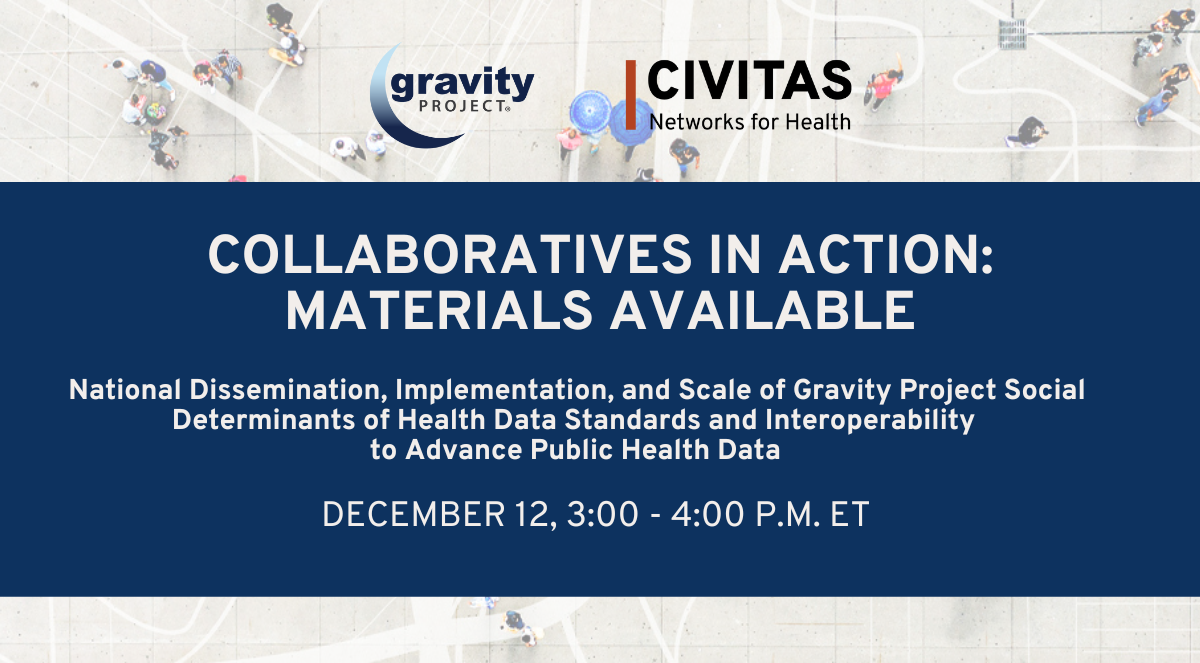
Collaboratives in Action: Social Care Voice Co-Design
Thank you to everyone who joined Civitas Networks for Health in partnership with Gravity Project for the second and final session of our two-part December 2023 Collaborations in Action series.
During this presentation, we highlighted how Civitas, Gravity, and partner, HealthBegins, brought together over 15 leaders in diverse social care settings to elevate the voice and perspective of providers. We discussed how over a six-session format, we solicited, synthesized, and documented social care provider feedback on Gravity data standards and resources, Gravity-relevant social care roles, requirements, and barriers and opportunities across social care settings. Join us to hear directly from social care leaders about this joint work.
In case you missed the event – or would like to revisit the conversation, a recording and presentation slides are now available!
Exploring Political Determinants of Health, the Impact on Health Equity, and Key Strategies for Effective Advocacy
Written by Jolie Ritzo, VP of Strategy and Network Engagement, Civitas Networks for Health
As we work to improve health throughout the country there is increasing recognition for addressing health-related social needs and a growing understanding that about 80% of what makes someone well will be determined outside of the realm of health care. In the past five years, there has been increased attention to addressing social determinants of health (SDOH), recognizing factors like housing, food security, transportation, education, and employment as crucial to health outcomes. However, a deeper layer of systems and structures exists beneath these social factors that need to be examined to advance health equity: the political determinants of health (PDOH).
In this blog post, we’ll underscore the importance of addressing PDOH to achieve health equity, through the viewpoint of recent roundtable discussions Civitas held with its members.
Defining the Political Determinants of Health
The political determinants of health refer to the policies, laws, and political systems that shape the distribution of power and resources, ultimately impacting public health outcomes. This concept extends beyond the traditional health care system, encompassing the broader socio-political and economic environment in which people live. It recognizes that health disparities are often rooted in political decisions that allocate resources, influence social norms, and create or dismantle systems that either support or hinder public health.
In the seminal work of Daniel E. Dawes, "The Political Determinants of Health," he describes PDOH as the systematic structuring of relationships, distribution of resources, and administration of power that collectively influence health equity. This concept was the cornerstone of our recent discussions during the Political Determinants of Health Member Roundtable series, where we dove deeper into the nuances of policy influence and coalition building, particularly in the context of gaining bipartisan support for maternal health, advancing interoperability to improve tribal health and Medicaid partnerships.
Bringing Light to the Political Determinants of Health Concept
Consider the impact of urban zoning laws, a political determinant with profound health implications. In many cities, zoning policies have historically contributed to segregated neighborhoods, with marginalized communities often confined to areas with limited access to fresh food, green spaces, and health care facilities. Such policies can lead to higher rates of chronic illnesses like asthma and diabetes in these communities.
By understanding and addressing these political determinants, policymakers, and public health professionals can work towards more equitable health outcomes, ensuring that everyone, regardless of their socio-economic status or neighborhood, has access to the conditions conducive to good health.
The Importance of Building Bipartisan Support for Maternal Health
Key to influencing health policy is the ability to build effective coalitions. Skillful advocacy often hinges on understanding divergent perspectives and looking for the common thread that can tie interests together. The first session of Civitas’ PDOH roundtable emphasized the importance of convening diverse partners to foster relationships and educate on fundamental and complex health topics. Partners from Dartmouth Health shared about their policy work and use of the ECHO model to increase stakeholder education. In New Hampshire, this approach of educating and coalition building catalyzed ongoing dialogue and shared understanding, increasing the potential for meaningful influence and ultimately resulting in a bipartisan maternal health bill passing.
Key strategies discussed included:
- Educational Initiatives: Providing partners with clear summaries of legislative activities and opportunities, coupled with educational efforts to measure and enhance understanding over time.
- Advocacy Ecosystem: Viewing coalition members, key partners, and legislators as integral components of an advocacy ecosystem, fostering a collaborative approach to policy influence.
- Active Listening and Responsiveness: Ensuring timely and thoughtful responses in all interactions and being acutely aware of the political environment, including the judicious use of political capital.
Tribal Health and the Need for Increased Data Interoperability
In discussions about tribal health, the importance of data standards, privacy, and security emerged as paramount. During the second session, Krystal Schramm, Senior Data Analyst, described efforts she is leading at Civitas member organization Michigan Health Information Network Shared Services (MiHIN) to connect the 12 federally recognized tribes in Michigan to improve health outcomes and support a more equitable healthcare experience for the tribal communities. Building trust with tribal populations and leaders involves transparent data usage and ownership communication.
Key takeaways from this targeted discussion included:
- Data at the Point of Care: Ensuring data is available at the point of care to build trust.
- Collaborative Problem-Solving: Working with tribes on specific use cases and bringing people together to understand real-life data, leading to shared understanding and solution development.
- Educating State Representatives: It's crucial to educate state representatives about the populations they serve, particularly in tribal communities.
Medicaid Partnerships
There are many federal and state policy levers tied to Medicaid that can drive health improvement and advance health equity. As we work to address unmet health-related social needs in new ways, we can use data to build the case for funding and support, and then generate data to show meaningful outcomes and efficacy. During the last session of the PDOH Member Roundtable series, we heard from Civitas members Health Impact Ohio and West Virginia Health Information Network about how they are partnering with their state Medicaid leaders and policymakers. In the case of the Central Pathways Community Hub, an initiative of Health Impact Ohio, they determined that there was a need to develop a community health worker workforce. Here are some of their key strategies:
- Acknowledge the political climate in your state, and then
- Align with the goals of both parties, in other words, find a common interest.
- Build relationships on both sides of the aisle.
- Fill gaps in meaningful ways.
- Show ROI.
- Align payment and policy.
- Make use of new opportunities presented by federal and state legislative and regulatory developments, such as the MCO maternal and infant mortality "hub" reimbursement mechanism created by SB 332 in Ohio and CMS' expanding Certified Community Behavioral Health Center program.
In West Virginia, they have been skillful with braiding, blending, and stacking multiple funding streams from varying partners, including state Medicaid. In having a broader viewpoint across initiatives, they can assist with aligning various state initiatives. WVHIN started small, opening one door, showing value, and then opening another.
Both members called attention to the importance of getting messaging right and being very thoughtful in working with different stakeholders. They also, like other presenters from the earlier sessions, called on the need for educating partners and policymakers. And lastly, recognizing the need for patience is critically important, as this work takes time; yet we need to be ready when the call comes.
Addressing Political Determinants of Health for Systemic Change
We must recognize the necessity of using advocacy and policy to create systemic and structural changes that advance health equity. The roundtable discussions underscored that true progress in advancing health equity requires a multifaceted approach, incorporating education, coalition-building, and a deep understanding of the political landscape. Core to all the discussions was the acknowledgment that trust is what drives this work. Relationships, both developing and maintaining them, cannot be overlooked.
By building strong, multistakeholder, and bipartisan coalitions and understanding the critical role of data and trust, we can move closer to a health and health care system that is equitable and just for all.
To learn more about Civitas’ member-only workgroups and webinars, visit our website. If you’re a Civitas member and would like to be included in future roundtable events, email our team.
Collaboratives in Action: Supporting Communities through Pilots and Shared Learning
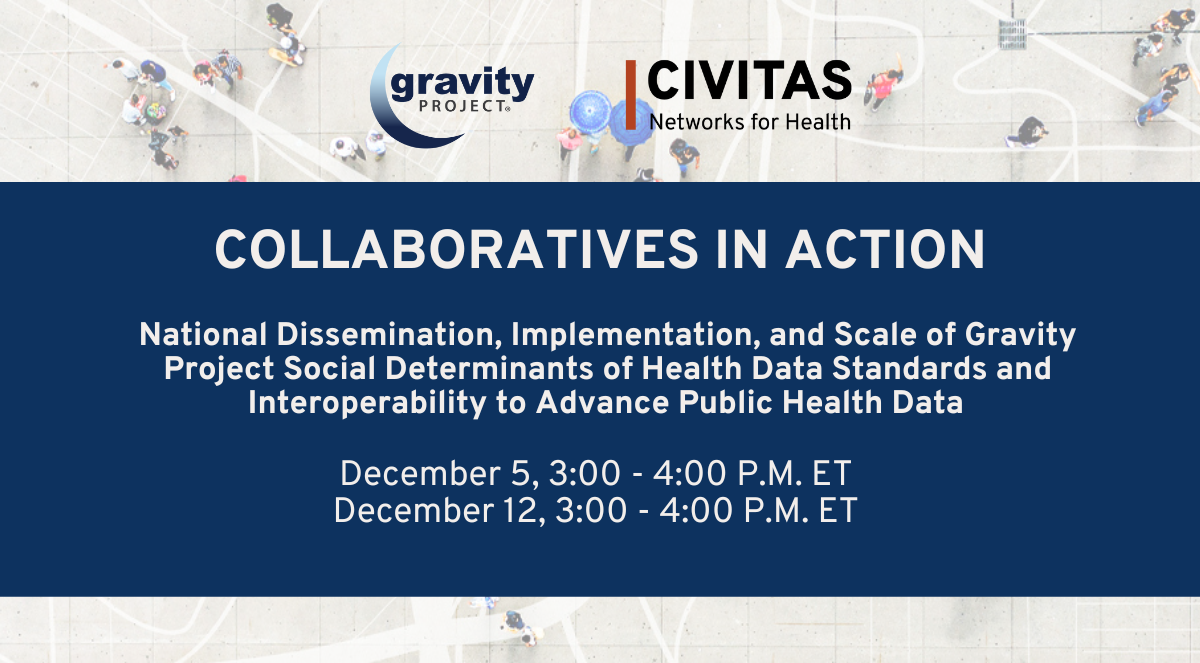
Collaboratives in Action: Community Information Exchange and Comprehensive Data Sharing to Create the Whole Picture
This session highlighted how Civitas and Gravity provided targeted training, technical assistance, shared learning opportunities, and relevant resources to support communities with implementation of Gravity social determinants of health data standards. We highlighted successes and opportunities for pilot sites in New York, Oklahoma, Colorado, and Arizona, and discussed how local efforts were highlighted in monthly affinity group meetings to best support the broader health data community. We also discussed how state public health departments came together through monthly state learning labs to facilitate collaborative learning and knowledge exchange for partners implementing Gravity Project data and exchange standards into state Medicaid waivers.
In case you missed the event – or would like to revisit the conversation, a recording and presentation slides are now available!
December Public Policy Briefing
December Public Policy Briefing
Unable to attend, or want to revisit the conversation? Materials are now available!
Standardizing Social Determinants of Health Data to Transform Equity
In the complex world of health care, data standardization is a pivotal yet often underappreciated aspect of delivering equitable care. Gravity Project is working diligently to develop consensus-based data standards to improve how we use and share information on social determinants of health (SDOH).
 Through Civitas Networks for Health and Gravity Project’s partnership, with generous support from the Robert Wood Johnson Foundation, both organizations have been working diligently to implement Gravity’s SDOH data standards at various pilot sites around the country. Through this work, we had the chance to sit down with Asha Immanuelle, a former Gravity Project team member whose roots are in perinatal nursing, to understand more about how she ventured beyond the immediacy of bedside care to make a significant impact in the broader health care ecosystem. When signing on with the Gravity team her mission was clear: to encode the nuances of SDOH data into a language that community organizations and health systems can universally understand and act upon.
Through Civitas Networks for Health and Gravity Project’s partnership, with generous support from the Robert Wood Johnson Foundation, both organizations have been working diligently to implement Gravity’s SDOH data standards at various pilot sites around the country. Through this work, we had the chance to sit down with Asha Immanuelle, a former Gravity Project team member whose roots are in perinatal nursing, to understand more about how she ventured beyond the immediacy of bedside care to make a significant impact in the broader health care ecosystem. When signing on with the Gravity team her mission was clear: to encode the nuances of SDOH data into a language that community organizations and health systems can universally understand and act upon.
Through this conversation, we gained a deeper understanding of how the Gravity SDOH data standard instruments can be used in various community health settings. Let’s learn more about Asha’s work to support our partnership.
Asha’s Journey to Population Health Management
After serving as a nurse for a number of years in a traditional hospital setting, a turning point in Asha's career was spurred by a stark realization of the direct link between health care biases, unmet health-related social needs, and patient harm. Determined to address these foundational issues, Asha pursued advanced education in population health management and became a prominent voice in the online health community:
“I started to share more about my public health education experience on Twitter and quickly found a group of like-minded people who cared about the same things I did,” said Asha. “It was through this that I found synergy with Sarah DeSilvey, the Terminology Director for Gravity Project. Next thing I knew, I was working with their team.”
It turns out that Asha’s alignment with the Gravity Project was serendipitous. Her involvement evolved from a community member to a central figure shaping the future of health data standardization and her work focused on the immense task of evaluating, selecting, and encoding numerous screening tools with Logical Observation Identifiers Names and Codes (LOINC), which are crucial for documenting and exchanging SDOH data.
Encoding the Language of Social Determinants of Health
The efforts of Asha and her team revolved around a singular goal: to create a seamless conduit for SDOH information across health care platforms.
This task, though technical in nature, carries profound implications for patient care. By meticulously reviewing and mapping out 135 screening instruments, they crafted a vital reference for community health workers and health care providers to identify and act on the social factors that significantly influence patient health outcomes.
The instruments that Asha and her team helped encode are more than mere data points; they represent a step towards a future where all aspects of a person's environment are considered in their care plan. Today, the Gravity Project and Civitas-led Pilot Sites actively utilize this database to effectively choose tools suited to their specific needs, a process Asha hopes will become industry standard with all tools encoded in LOINC.
The pilot sites are leading the charge in applying the standards developed by the Gravity Project. In the diverse landscapes of the University of Colorado, Pima County in partnership with an anonymous local tribe, the state of New York, and the connected communities MyHealthAccess Network serves in Oklahoma, these standards are not just theoretical—they're the blueprint for transformative practices. Each of these pilot sites brings its unique patient demographics and social complexities, necessitating tailored use of the Gravity Project's tools to accurately document and code social determinants of health data. With neutral convening support from Civitas and technical support from Gravity, these pilot sites are ensuring that precise encoding takes place regardless of the health care delivery setting – be it a tribal community where traditional practices intertwine with modern medicine, or an urban hospital facing a mosaic of socioeconomic challenges, each patient's social needs are identified and addressed within a unified system.
This practical application of standardized SDOH coding is a testament to how the strategic groundwork laid by Asha and her team is fueling a nationwide shift towards comprehensive, culturally sensitive, and equitable health care.
Recognizing the Challenge of Effective Communication for Complex Tools
Despite the progress made through the detailed mapping of screening tools, Asha's experience at a LOINC conference underscored a pivotal challenge: the need for Gravity Project's work to be communicated more effectively. The tools and resources are there, but the message needs simplification. Asha advocates for clearer messaging to accelerate the adoption of these standardized tools, thus unveiling and addressing hidden social needs at scale.
Effective communication about these tools is vital in cultivating a shared understanding and operational language among clinicians, policymakers, community health workers, and patients. Simplifying the complexity of these instruments into digestible, actionable knowledge enables diverse users to recognize the power of a common toolkit. It's not just about having standardized resources; it's about ensuring everyone, from the policy architect to the patient advocate, grasps their role in this standardized ecosystem.
By speaking the same language and using the same precise tools, the entire health community can collectively identify, understand, and address the social determinants impacting health outcomes, leading to a more synchronized, effective, and equitable health care system for all.
Beyond Standardization: Advancing Health Equity
Today, Asha works at NCQA, a Civitas Networks for Health member, where her projects align closely with the objectives of Gravity, especially in the construction of state-level community health worker programs. These programs, utilizing the standardized screening tools Asha helped encode, are essential in bridging the trust gap between patients and the traditional health care system.
Asha Immanuelle’s contributions mark a significant stride forward in the journey toward comprehensive health equity. Her pioneering efforts in standardizing SDOH data are vital for creating an equitable health care framework that recognizes and responds to the unique circumstances of each individual. Civitas celebrates this synergy, understanding that such transformative tools, particularly when made freely accessible by the Gravity Project, are the cornerstones of future health innovations.
In this shared vision, we continue to advocate for the widespread adoption of these instruments, confident that they are not just technical resources but instruments of change, ensuring every person receives the personalized and dignified care they deserve.
To learn more about Civitas' partnership with Gravity Project, visit our website.
With generous support from the Robert Wood Johnson Foundation (RWJF), Civitas Networks for Health has partnered with the Gravity Project® leadership, Health Level Seven® (HL7®), and various Civitas members to facilitate the dissemination and implementation of Gravity Project standards through Q4 2023. Our efforts involve engaging with national, regional, and local community partners to gain insights from and provide support for the Gravity pilot's work stream.
Support for this project was provided by RWJF. The views expressed here do not necessarily reflect the views of the Foundation.
Member Roundtable | Political Determinants of Health Series: Medicaid Partnerships - Session Three
Civitas Networks for Health Member Roundtable: Political Determinants of Health Series
During our third and final session of our Political Determinants of Health Member Roundtable series, we focused on Medicaid partnerships. We led with a brief overview of Medicaid funding pathways and then more specifically examined partnerships between Health Impact Ohio and Ohio Medicaid and West Virginia Health Information Network and West Virgina Medicaid. There were so many great insights, some of which are captured here:
- Key tactics for Medicaid funding partnerships:
- Coordinate public and private data and technology strategies and investments.
- Integrate data, interoperability, and technology needs into all health transformation and modernization activities, programs, and services.
- Communicate benefits and value adds to all partners.
- Maximize federal match technology planning, implementation, and maintenance.
- Align programs and investments at the county or community level.
- In working to address unmet health related social needs in new ways, use data to build the case, and then generate data to show outcomes and efficacy.
- Assess resources and gaps, one of which may be workforce. In the case of the Central Pathways Community Hub, an initiative of Health Impact Ohio, there was a need to develop a community health worker workforce.
- Acknowledge the political climate in your state, and then:
- Align with the goals of both parties, in other words, find common interest.
- Build relationships on both sides of the aisle.
- Fill gaps in meaningful ways.
- Show ROI.
- Align payment and policy.
- Make use of new opportunities presented by federal and state legislative and regulatory developments, such as the MCO maternal and infant mortality “hub” reimbursement mechanism created by SB 332 in Ohio and CMS’ expanding Certified Community Behavioral Health Center program.
- Increase education among stakeholders.
- Center on community, and the community’s needs.
- Look across your state’s agencies, and be willing to bridge holes, making you a partner in creating alignment.
- One way to not only increase your organization’s sustainability, but also increase greater connection across your state’s health ecosystem is to braid, blend, and stack funding streams from multiple sources.
- Start small, define a use case or a project, show value, and you will build credibility.
- Getting messaging right is critical. Be very thoughtful about how you share your value among various stakeholders.
- Be patient, this work takes time, and be ready when the call comes.
In case you missed this event, or want to revisit the discussion, materials are now available!
Exclusive Member Event | 2023 National Health Information Exchange Organization Survey
Exclusive Member Event: 2023 National Health Information Exchange Organization Survey Results
Thank you to all who were able to attend our presentation of the results from the 2023 National Health Information Exchange Organization (HIO) Survey presented by Civitas Networks for Health and the University of California San Francisco School of Medicine’s Clinical Informatics and Improvement Research Center. The National HIO Survey is the most comprehensive and authoritative poll of HIEs available in the industry, developed by combining Civitas’ experience and UCSF’s unique expertise with federal support from ONC, and made possible by the participation of our members.
In case you missed this event, or want to revisit the discussion, materials are now available!



